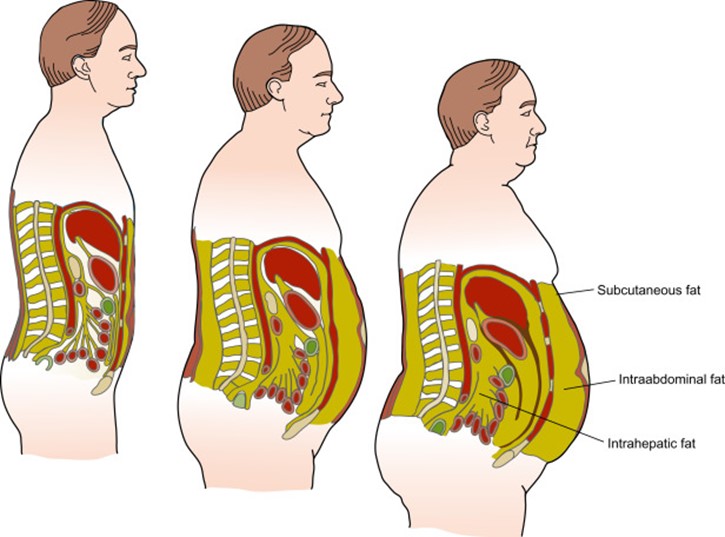A nurse is teaching a group of clients about risk factors for developing diabetes mellitus. The nurse should include which of the following as a risk factor for diabetes?
Abdominal obesity
Elevated HDL level
History of hypotension
History of hyperthyroidism
The Correct Answer is A
Choice A reason: Abdominal obesity is a risk factor for developing diabetes mellitus. Abdominal obesity, also known as central obesity or visceral fat, is the accumulation of fat around the abdomen and organs. Abdominal obesity can cause insulin resistance, inflammation, and metabolic syndrome, which are all associated with diabetes.
Choice B reason: Elevated HDL level is not a risk factor for developing diabetes mellitus. HDL stands for high-density lipoprotein, which is a type of cholesterol that carries excess cholesterol from the tissues to the liver for disposal. HDL is also known as "good" cholesterol, as it helps protect against heart disease and stroke. A high HDL level is desirable and beneficial for health.
Choice C reason: History of hypotension is not a risk factor for developing diabetes mellitus. Hypotension means low blood pressure, which is usually defined as less than 90/60 mm Hg. Hypotension can cause symptoms such as dizziness, fainting, fatigue, and blurred vision. Hypotension can be caused by dehydration, blood loss, medication side effects, or other conditions.
Choice D reason: History of hyperthyroidism is not a risk factor for developing diabetes mellitus. Hyperthyroidism means overactive thyroid gland, which produces too much thyroid hormone. Thyroid hormone regulates metabolism, growth, and development. Hyperthyroidism can cause symptoms such as weight loss, nervousness, palpitations, heat intolerance, and insomnia. Hyperthyroidism can be caused by Graves' disease, thyroid nodules, or thyroiditis.

Nursing Test Bank
Naxlex Comprehensive Predictor Exams
Related Questions
Correct Answer is A
Explanation
Choice A reason: Abdominal obesity is a risk factor for developing diabetes mellitus. Abdominal obesity, also known as central obesity or visceral fat, is the accumulation of fat around the abdomen and organs. Abdominal obesity can cause insulin resistance, inflammation, and metabolic syndrome, which are all associated with diabetes.
Choice B reason: Elevated HDL level is not a risk factor for developing diabetes mellitus. HDL stands for high-density lipoprotein, which is a type of cholesterol that carries excess cholesterol from the tissues to the liver for disposal. HDL is also known as "good" cholesterol, as it helps protect against heart disease and stroke. A high HDL level is desirable and beneficial for health.
Choice C reason: History of hypotension is not a risk factor for developing diabetes mellitus. Hypotension means low blood pressure, which is usually defined as less than 90/60 mm Hg. Hypotension can cause symptoms such as dizziness, fainting, fatigue, and blurred vision. Hypotension can be caused by dehydration, blood loss, medication side effects, or other conditions.
Choice D reason: History of hyperthyroidism is not a risk factor for developing diabetes mellitus. Hyperthyroidism means overactive thyroid gland, which produces too much thyroid hormone. Thyroid hormone regulates metabolism, growth, and development. Hyperthyroidism can cause symptoms such as weight loss, nervousness, palpitations, heat intolerance, and insomnia. Hyperthyroidism can be caused by Graves' disease, thyroid nodules, or thyroiditis.

Correct Answer is D
Explanation
Choice A reason: BMI of 18.5 is at the lower end of the normal range (18.5-24.9), but it does not indicate severe malnutrition.
Choice B reason: Potassium 3.7 mEq/L is within the normal range (3.5-5.0), and it does not indicate electrolyte imbalance due to malnutrition.
Choice C reason: Phosphorus 3.5 mg/dL is within the normal range (2.5-4.5), and it does not indicate mineral deficiency due to malnutrition.
Choice D reason: Albumin 2.5 g/dL is below the normal range (3.5-5.0), and it indicates protein deficiency due to malnutrition. Albumin is a major protein in blood plasma that helps maintain fluid balance, transport hormones, and fight infections. Low albumin levels can cause edema, weakness, infection, and poor wound healing.
Whether you are a student looking to ace your exams or a practicing nurse seeking to enhance your expertise , our nursing education contents will empower you with the confidence and competence to make a difference in the lives of patients and become a respected leader in the healthcare field.
Visit Naxlex, invest in your future and unlock endless possibilities with our unparalleled nursing education contents today
Report Wrong Answer on the Current Question
Do you disagree with the answer? If yes, what is your expected answer? Explain.
Kindly be descriptive with the issue you are facing.
